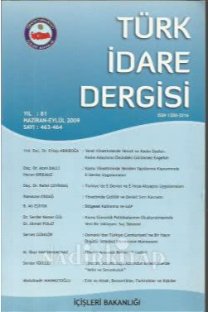GÜVENLİK İLE İLGİLİ KAMU HİZMETİ SUNUMUNDA TOPLUM DESTEĞİ VE ETİK MÜLAHAZALAR
ETHICAL CONSIDERATIONS IN SECURITY-RELATED PUBLIC SERVICES AND COMMUNITY SUPPORT
___
- Braswell, M. (2005). Ethics, crime, and justice: An introductory note to students.
- In Braswell, M., McCarthy, B. ve McCharty, B. (Eds.). Justice Crime And Ethics, ss. 3-10. Cincinnati, OH: Anderson.
- Carlson, D.S., Kacmar, K. M. ve Wadsworth, L. L. (2002). The impact of moral intensity dimensions on ethical decision making: Assessing the relevance of orientation. Journal of Managerial Issues, 14(1), 15-30.
- Çalı, H. H. ve Tombul, F. (2012). Güvenlik ile ilgili kamu hizmeti sunumunda sosyal medya. Türk İdare Dergisi, 474, 55-76.
- Delattre, E. (2006). Character And Cops: Ethics In Policing. Washington, DC: The AEI Press.
- Delice, M. ve Duman, A. (2012). Toplum destekli polislik kapsamında halkın polis algısının ölçülmesi: Erzurum ili örneği. Polis Bilimleri Dergisi, 14(2), 1-31.
- Duman, A. (2010). Toplum destekli polislik eğitimi. Sözer, M.A. Sözer (Ed.), Toplum Destekli Polislik: Toplum, Suç ve Güvenlik, ss.179-194. Ankara: Adalet Yayınevi.
- Fletcher, J. (1997). Situation Ethics: The New Morality. Louisville, KY: Westminster John Knox Press.
- Forsyth, D. R. ve Nye, J. L. (1990). Personal moral philosophies and moral choices. Journal of Research in Personality, 13, 205-221.
- Gold, J. (2005). Utilitarian and deontological approaches to criminal justice. In Braswell, M., McCarthy, B. ve McCharty, B. (Eds.). Justice Crime and Ethics. ss.11- 22 Cincinnati: Anderson.
- Harris, C. (1986). Applying Moral Theories. Belmont, CA: Wadsworth. Jones, T. M. (1991). Ethical decision making by individuals in organizations: An issue contingent model. Academy of Management Review, 16(2), 366-395.
- Kant, I. (1949). Critique Of Practical Reason, Translation. Lewis White Beck. Chicago, IL: University of Chicago Press.
- Kant, I. (1964). Ground Work Of The Metaphysics Of Morals (translated by H. J. Paton). New York, NY: Harper & Row.
- Kleinig, J. (1999). The Ethics Of Policing. New York: Cambridge University Press.
- Özdemir, M. (2008). Kamu yönetiminde etik. ZKÜ Sosyal Bilimler Dergisi, 4(7), 179-195.
- Öztürk, N. K. (2004). Machiavelli ve Weber perspektifinden siyasal liderlik etiği. Amme İdaresi Dergisi, 37(2), 13-30.
- Peak, K. J., Stitt, B. G., ve Glensor, R. W. (1998). Ethical considerations in community policing and problem solving. Police Quarterly, 1(3), 19-34.
- Pollock, J. M. (2007). Ethical Dilemmas And Decisions In Criminal Justice. Belmont: Wadsworth.
- Rest, J. R. (1984). Research on moral development: Implications for training counseling psychologists. Counseling Psychologist, 12(3), 19-29.
- Souryal, S. S. (2007). Ethics In Criminal Justice: In Search Of The Truth (4th ed.). Cincinnati, OH: Anderson Publication.
- Sözer, M. A. ve Köksal, T. (2010). Toplum destekli polislik ve suç. M.A. Sözer (Ed.), Toplum Destekli Polislik: Toplum, Suç ve Güvenlik, ss. 21-43. Ankara: Adalet Yayınevi.
- Sözer, M. A. ve Ekici, N. (2010). Toplum destekli polisliğin teorik altyapısı ve kavramsal çerçevesi. M.A. Sözer (Ed.), Toplum Destekli Polislik: Toplum, Suç ve Güvenlik, ss. 3-20. Ankara: Adalet Yayınevi.
- Stace, W. (1995). Ethical relativity and ethical absolutism. In Close, D. and Meier, N. (Eds.). Morality And Criminal Justice, ss. 25-32. Belmont, CA: Wadsworth.
- Thompson, D. F. (1985). The possibility of administrative ethics. Public Administration Review, 45, 555-561.
- Walker, S. (2011). Sense and Nonsense About Crime, Drugs and Communities. Belmont, CA: Wadsworth.
- ISSN: 1300-3216
- Yayın Aralığı: 2
- Başlangıç: 1928
- Yayıncı: İçişleri Bakanlığı
TÜRKİYE’DE BÜYÜKŞEHİR BELEDİYELERİNİN GENEL AĞ (WEB) SİTELERİNİN ANALİZİ
TOPLUM SÖZLEŞMECİLERİNDEN 11 EYLÜL’E GÜVENLİK ANLAYIŞINDAKİ DEĞİŞİM
EUROPOL: TÜRKİYE’NİN OPERASYONEL İŞBİRLİĞİ TARTIŞMASI
TÜRKİYE’DE KAMU KAYNAKLI SOSYAL YARDIMLAR: SANSÜRLÜ REGRESYON ANALİZİ
Engin GEZER, Şenay ÜÇDOĞRUK BİRECİKLİ
TEMEL POLİS EĞİTİM PROGRAMLARININ GELİŞTİRİLMESİ: POLİS EĞİTİMİNDE BİR İHTİYAÇ ANALİZİ ÇALIŞMASI
GÜVENLİK İLE İLGİLİ KAMU HİZMETİ SUNUMUNDA TOPLUM DESTEĞİ VE ETİK MÜLAHAZALAR
